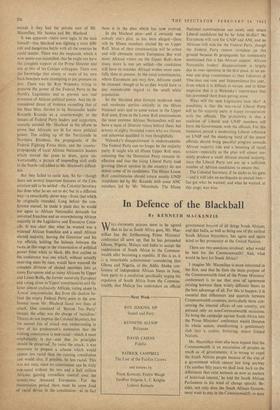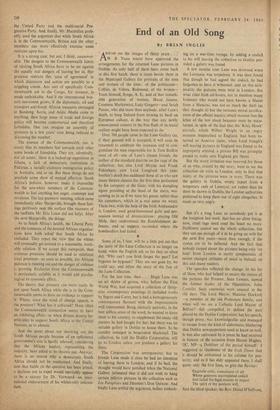In Defence of the Blackball
By KENNETH MACKENZIE
W ELI. INFORMED sources seem to be agreed that as far as South Africa goes, Mr. Mac- millan has the forthcoming Prime Ministers' conference all sewn' up; that he has persuaded Ghana, Nigeria, Malaya and India to accept the readmission of South Africa to the Common- wealth after becoming a republic. If this is so, it is a remarkable achievement—considering that Ghana and Nigeria, at the Addis Ababa con- ference of independent African States in June, were party to a resolution specifically urging the expulsion of. South Africa from the Common- wealth; that Malaya has undertaken an official government boycott of all things South African; and that India, as well as being one of the earliest South African boycotters, has again and again acted as her prosecutor at the United Nations.
There are two questions involved : what would be best for the Commonwealth? And, what would be best for South Africa?
I imagine Mr. Macmillan is more interested in the first, and that he feels the main purpose of the Commonwealth (and of the Prime Ministers' conference) is to use that area of agreement existing between these widely different States to the best advantage of all. For this to happen, it is essential that differences and quarrels between Commonwealth countries, particularly those con- cerning the internal affairs of one country, are pursued only on non-Commonwealth occasions. To bring the campaign against South Africa into the Prime Ministers' conference would threaten its whole nature, transforming a gentlemanly club into a useless, bickering, minor United Nations.
Mr. Macmillan must also have argued that the Commonwealth is an association of peoples as much as of governments; it is wrong to expel the South African people because of the sins of a government which cannot last long anyway ('In another fifty years we shall look back on the differences that exist between us naw as matters of historical interest,' he told the South African Parliament in his wind of change speech). Be- sides, not only does the South African Govern- ment want to stay in the Commonwealth; so does the United Party and the multi-racial Pro- gressive Party. And, finally, Mr. Macmillan prob- ably used the argument that while South Africa is in the Commonwealth, Britain and the other members can more effectively exercise some restraint upon her.
It is a strong case; but not, I think, unanswer- able. The dangers to the Commonwealth fabric of ejecting South Africa have to be set against the equally real dangers of leaving her in. Her presence restricts this 'area of agreement' in which discussion and action are possible to a crippling extent. Any sort of specifically Com- monwealth aid to the Congo. for instance, is made unthinkable. And if the international boy- cott movement grows, if the diplomatic, oil and transport anti-South African measures envisaged at Bandung, Accra, and Addis Ababa come to anything, then large areas of trade and foreign policy will become controversial and therefore forbidden. One can imagine an assembly of premiers in a few years' time being reduced to discussing the weather.
The essence of the Commonwealth, too, is surely that its members feel towards each other some bonds of friendship. They are, admittedly, not all saints: there is a locked-up opposition in Ghana, a lack of democratic institutions in Pakistan, a racially exclusive immigration policy in Australia, and so on. But these things do not preclude some show of mutual affection. South Africa's policies, however, make it impossible for the non-white members of the Common- wealth to feel anything but anger, contempt and revulsion. The last premiers' meeting, which came immediately after Sharpeville, brought these feel- ings perilously near the surface (the manners of the ineffable Mr. Eric Louw did not help). After the next Sharpeville, the deluge.
As to South Africa's health, the Liberal Party and the remnants of the banned African organisa- tions have both asked that South Africa be excluded. They reject the view that the whites will eventually get around to a reasonable, work- able solution. If we accept this viewpoint, then overseas pressures should be used to reinforce local pressures—as soon as possible, for African patience is running out and the danger of violence is growing. Exclusion, from the Commonwealth is particularly suitable as it would add psycho- logical to economic effect.
The theory that pressure can more easily be put upon South Africa while she is in the Com- monwealth seems to have no evidence to support it. Where, since the wind of change speech, is the pressure? What has it achieved? More often the Commonwealth connection seems to have an inhibiting effect---as when Britain deserts her principles to support South Africa at the United Nations, or to abstain.
And the point about not throwing out the South African people because of an ephemeral government's sins is hardly relevant, considering that the African leaders, representing the majority, have asked to be thrown out. Anyway, there is no reason why a democratic South Africa should not be readmitted. And finally, now that battle on the question has been joined, a decision not to expel would inevitably appear to be a victory for Dr. Verwoerd—an inter- national endorsement of his whites-only referen- dum.







































 Previous page
Previous page